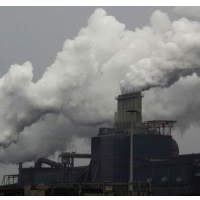Big U.S. Firms on Board to Pay Carbon Fees, Signaling another Republican Party Rift
 (AP Photo)
(AP Photo)
The United States’ largest oil companies, as well as dozens of other major corporations, have seemingly decided climate change is for real, and it’s time to prepare for it. But this position does not sit well with many in the Republican Party who refuse to acknowledge climate change and insist on fighting any federal policies addressing it.
At least 29 companies, including ExxonMobil and Walmart, are incorporating a price on carbon into their long-term financial planning, according to a new report (pdf) from CDP, an environmental data firm. The companies are doing this because they expect Washington to eventually require this cost of them in an attempt to reduce greenhouse gas emissions.
“The development is a striking departure from conservative orthodoxy and a reflection of growing divisions between the Republican Party and its business supporters,” Coral Davenport wrote for The New York Times. “The divide, between conservative groups that are fighting against government regulation and oil companies that are planning for it as a practical business decision, echoes a deeper rift in the party, as business-friendly establishment Republicans clash with the Tea Party.”
Many in the GOP are afraid that these companies will be more likely to support policies pushed by Democrats to slow down global warming.
Critics also include Charles and David Koch, the billionaire backers of Republican candidates, who object to any climate change policy that may impact their oil and paper-goods businesses.
And yet ExxonMobil, the nation’s largest oil corporation—which, along with the four other top oil producers, are major contributors to the Republican Party—has publicly acknowledged that fossil fuels contribute to climate change. That was not its position a decade ago, according to Davenport.
“Ultimately, we think the government will take action through a myriad of policies that will raise the prices and reduce demand” of carbon-polluting fossil fuels, Alan Jeffers, an ExxonMobil spokesman, told the Times.
The bottom line is that the companies are making business decisions, according to CDP North American president Tom Carnac. “It’s climate change as a line item,” he told the Times. “They’re looking at it from a rational perspective, making a profit. It drives internal decision-making.”
Government taxing of emissions resulting from carbon pollution regulations may well be in the future, and companies know this. “Companies see that the trend is inevitable,” insisted Carnac. “What you see here is a hardening of that understanding.”
Many observers seem to agree that companies hit with these fees will pass the costs on to their consumers, which will have the effect of transitioning the market away from coal and oil—contributors of global warming—and over to renewable energy sources.
That scenario doesn’t sit well with the contingent within the Republican camp that does not subscribe to what the majority of the scientific community has determined is the cause of climate change.
ExxonMobil’s Jeffers said that his company will be on board with a carbon tax provided it is offset by an equivalent tax cut, a proposal that has been endorsed by former Vice-President Al Gore.
“ExxonMobil and many other large companies understand that climate change poses a direct economic threat to their businesses,” Dan Weiss, director for climate policy at the Center for American Progress, told the Times. “They need to convince their political allies to act before it’s too late.”
- Danny Biederman, Noel Brinkerhoff
To Learn More:
Large Companies Prepared to Pay Price on Carbon (by Coral Davenport, New York Times)
Use of Internal Carbon Price by Companies as Incentive and Strategic Planning Tool (CDP) (pdf)
Big Oil Anticipates 10-Fold Surge in Carbon Emission Cost (by Joe Carroll, Bloomberg)
U.S. and China Fight European Airline Pollution Charges (by Noel Brinkerhoff, AllGov)
- Top Stories
- Unusual News
- Where is the Money Going?
- Controversies
- U.S. and the World
- Appointments and Resignations
- Latest News
- Trump Renames National Football League National Trump League
- Trump to Stop Deportations If…
- Trump Denounces World Series
- What If China Invaded the United States?
- Donald Trump Has a Mental Health Problem and It Has a Name






Comments